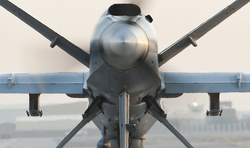 There is nothing exactly new in Stephen Hawking's warning that artificial intelligence may destroy us all—science fiction delivered this warning in Karel Čapek's R.U.R. and Fred Saberhagen's Berserker series, to say nothing of the genre's key nodal point, Mary Shelley's Frankenstein, or, The Modern Prometheus—but as we trudge through the early years of the twenty-first century, perhaps it bears repeating. “Our future is a race between the growing power of technology and the wisdom with which we use it,” he said.  Although I understand his fear, to say nothing of the fears of others, that our machines may become our masters, but I also tend to believe that it is a bit of a false fear. The singularity sounds convincing on paper, but, as Bruce Sterling once opined, it simply has no business model. We confuse the trapping of science fiction with prophecy, and often misunderstand that it exists in the realm of metaphor. That doesn't mean machines do not change us emotionally and psychologically. The prospect of our machines going Frankenstein frightens, but less so than how we use our machines against each other, specifically in drone warfare, our modern-day equivalent of the robot uprising. These include a false sense of invulnerability, to the challenges of fully mechanized machines. The option of having totally robotized drones would certainly eliminate any problems involving humans in the command centers. However, it would have another security weakness: these machines would be dependent upon GPS data, which can easily be jammed or manipulated. In the course of a test organized by the American authorities in June 2012, a group of researchers from the University of Texas demonstrated how easily a drone could be brought down in this way. Thanks to an apparatus put together at the cost of a few thousand dollars’ worth of material, “we fooled the UAV into thinking that it was rising straight up.” The drone’s autopilot immediately compensated, sending the drone toward the ground. If no one had intervened, it would have crashed.
0 Comments
Leave a Reply. |
Derek Austin Johnson has lived most of his life in the Lone Star State. His work has appeared in The Horror Zine, Rayguns Over Texas!, Horror U.S.A.: Texas, Campfire Macabre, The Dread Machine, and Generation X-ed. His novel The Faith was published by Raven Tale Publishing in 2024.
He lives in Central Texas. Archives
May 2024
Categories |

 RSS Feed
RSS Feed